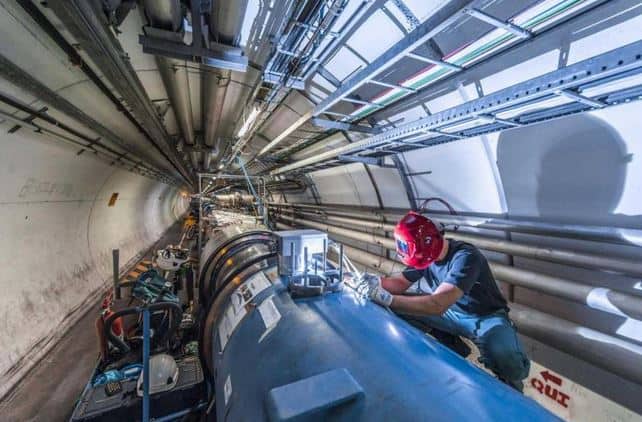An ‘intermittent’ short circuit to ground in one of the Large Hardon Collider’s magnet circuits was identified on March 21st, which will delay its restart after remaining idle for two years while it underwent maintenance and an upgrade.
CERN (Conseil Européen pour la Recherche Nucléaire – European Council for Nuclear Research), the research organization that operates the Large Hadron Collider (LHC), the world’s largest and most powerful particle collider, says the machine’s second run is “coming ever closer. Seven of LHC’s eight sectors have successfully been commissioned to the 2015 operating energy of 6.5 TeV per beam, while the 8th “is not far behind.”
However, it added that this week there will be no circulating beam in the LHC.

For the last two years, the Large Hadron Collider has been undergoing maintenance and an upgrade. (Image: CERN)
The short circuit is still under investigation, CERN announced. Although the problem is a well understood one, it could take time to resolve, given that it is in a cold section of the machine. Repairing it requires warming up and then re-cooling after the repair.
CERN’s Director for Accelerators, Frédérick Bordry, said:
“Any cryogenic machine is a time amplifier. So, what would have taken hours in a warm machine could end up taking us weeks.”
CERN believes the delay could be from just a few days to several weeks. “A full assessment is on going, and a revised schedule will be announced as soon as it is known,” it wrote.
The Swiss-based organization says that whatever the case, the short-circuit’s impact on LHC operations will be “minimal”. This is the year for fully understanding the performance of the revamped LHC with a view to full-scale physics running as from next year until 2018.
CERN Director General, Rolf Heuer, said:
“All the signs are good for a great run 2. In the grand scheme of things, a few weeks delay in humankind’s quest to understand our universe is little more than the blink of an eye.”
LHC now a much mightier beast
The Large Hadron Collider, the biggest machine in the world, is 65% more powerful now than it was when it was put to sleep two years ago for planned maintenance and an upgrade.
LHC is a particle accelerator, a machine that speeds up subatomic particles to extremely high speeds by means of electric or electromagnetic fields. The accelerated particles crash into other particles, either as a research technique or to generate gamma rays and high-energy X-rays.
When operational again, LHC’s collision energy will increase from its previous 8 TeV (Terraelectron-Volts) to 13 TeV.
In 2013, LHC physically proved the existence of the Higgs boson, a sub-atomic particle often referred to as the ‘God Particle’, that was only known about theoretically.
Scientists hope the LHC will help them find out whether there might be a whole family of Higgs bosons. Supersymmetry Theory suggests there are five types. Finding them would be the scientific breakthrough of the century, researchers say.
Some people say the mightier LHC may prove that the Big Bang never happened.
